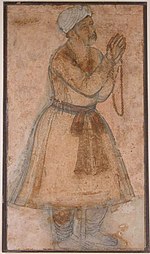Qustanti Islam
This page is currently undergoing major reconstruction in accordance with broader lore changes. |
Qustanti Islam or Jama'at as-Sunnah al-Myarabiq ar-Suqs ("Community of the Sacred Tradition of Muhammad through the lineage of Ali") is a form of Shi'a Islam notable for its distinctive theology and jurisprudence. Qustantism originated in islands off of Sarpedon corresponding to the territory of Qustantistan, a Qustanti confessional state. A traditionalist school of Islamic thought, Qustantism emphasises community and continuity as central principles of Islam, viewing the Muslim ummah, rather than any physical text or abstract idea, as the essential instrument for the manifestation of God's will on Earth. Many aspects of Qustanti belief, organisation, and practice bear great similarity to apostolic Christianity, particularly Catholicism, and are widely attributed to the Christian heritage of Qustantistan prior to the Islamic conquest and influence of post-conquest Audonian Christians in Sarpedon. However, Qustanti theologians reject all accusations of syncretism, and defend such elements as thoroughly Islamic and keeping continuity with the teachings of ʿĪsā ibn Maryam and earlier prophets.
Theology
At the core of Qustanti theology is Allah - God - as the Ultimate Reality, manifested in a Divine Trinity with Muhammad and Ali.
Many aspects of Qustanti theology are expounded in the Melian Dialogues, an XYth century text recording a debate between the Shapiri mufti Al-Anon and the Qustanti qadi Al-Needanāme in the city of Ktoriba, Melian Islands. The Dialogues open with each scholar criticising the characteristic beliefs of the other's school, namely the Shapiri discovery of religious truths through the application of logic to Qur'ānic facts and the Qustanti deference to tradition, consensus, and clerical authority. The debate cycles through three rounds of arguments and counter-arguments toward an inconclusive ending often interpreted as implying that both approaches may be two sides of the same coin. Although it is possible that the debate recounted in the text has been substantially added to and revised by later scribes or may never have actually taken place, the Melian Dialogues are nonetheless widely read in Shi'a clerical schools and even by Sunni scholars.
Mariology
Jurisprudence
In Qustanti fiqh, the supreme sources of law are the Qur'ān and sunnah. In principle, Qustanti jurists regard sunnah or tradition, which Qustantis refer to as as-Sunnah al-muqadasa ("Sacred Tradition") as coëqual with the Qur'ān in terms of authority. However, they do not hold all instances of sunnah to be equally authoritative. This principle is most often applied with regard to hadith, where jurists will give priority to the Qur'ān or a more reliably-sourced hadith over a less reliably-sourced hadith. Like other Shi'a, Qustantis consider sunnah to include the words, acts, and acknowledgements not only of Muhammad himself, but also of his daughter Fatima, Ali, and the eleven Imams succeeding Ali, whom they believe to be infallible. [Non-hadith sunnah here]
Sunnah, in the Qustanti understanding, predates both the Qur'ān and Muhammad, and is actually the tradition of the prophets, beginning with Abraham, and is conserved (albeit incompletely and with error) among Christians, Jews, and Ishmaelites.
If the Qur'ān and sunnah are silent on an issue or do not provide sufficient basis for a clear ruling, Qustanti jurists refer to secondary sources of law, either directly or to better illuminate higher sources. Foremost among these is ijma', or consensus. In common with other Shi'a, Qustantis consider consensus among the Companions of the Prophet is considered an extension of Sacred Tradition and is binding, as is consensus of the ulama under the infallible Twelve Imams. Unlike other Shi'a, Qustantis also consider consensus among the first three generations of the citizens of Medina to be binding, although subordinate to consensus among the two aforementioned groups. Consensus among later Qustanti ulama and among the Qustanti community at large carries persuasive value, but is not binding.
History
Pre-Islamic beliefs in the Melian Islands
Scholarly center in Qustantistan
Rise of the Qustanti Caliphs

The confessional state
The independence of Qustantistan as part of the broader Crusades had the effect of solidifying Qustanti Islam as a distinct and surviving religious tradition. Historians generally attribute 1144, the year of the Third Crusade, as the beginning of the period of "modern" Qustanti Islam. From that period, an unbroken line of Caliphs have governed the Qustanti faithful. Beginning with the age of exploration and advent of global trade and early modern period, Qustanti Islam found its way to many different countries and continents. In the 21st century, Qustanti communities are present on all seven continents.
Organisation

The central position within Qustanti Islam is the office of Caliph, the successor of the prophet Muhammad. In this role, the Caliph has definitive teaching authority to a point; in incidences where the Qur'ān and sunnah are silent, the Caliph is considered to have ultimate scholarly and legal authority to resolve a dispute. In such disputes, the Caliph must cite previous sources in statements which are formed hierarchically, beginning with any tertiary possible Quranic references and ending with personal views or recent scholarship, with all other sources falling in between. In this sense, the teaching authority of the Caliph is that of "supreme scholar" rather than an independent arbiter or teacher, although his proclamations are believed to have an infallible nature. The infallible teaching of the Caliph is viewed in Qustanti Islam in light of Ismah, a type of inerrancy emphasized also in Shi'a Islam.
The Qustanti Caliph must always have some type of direct blood descent from the Caliph Ali, and thus must be members of the Ahl al-Bayt the family of Muhammad. These characteristics are shared with Shi'a belief, but unlike the Shi'a, the Qustanti Caliph is elected from among a number of eligible men known to descend directly from Ali. The electorate is the "miaya" ("hundred"), a body of qadis and other clerics whose scholarly credentials are highly respected and beyond repute. The number of men in the miaya usually includes more than a hundred, and its members are selected by the existing miaya in conjunction with the reigning Caliph. The Caliph, together with the men of the miaya, are considered by Qustanti Muslims to be the highest scholars of Fiqh alive at any one time.
Unlike other types of Islam, clerics within Qustanti Islam are considered by the faithful to have a sacerdotal character, and are not merely men well educated in Islamic jurisprudence. This clerical role is referred to as the "Mullahate", and all Caliphs and men of the miaya as well as all qadis and lower clerics who serve in official roles are required to be part of the Mullahate. The Tawrat and as-Sunnah al-muqadasa ("sacred tradition"), according to Qustanti Muslims, "clearly and irrevocably" sets apart certain men for holy duty, as reflected in even the "corrupted practice" of Christians and Jews.
Qadis (bishops) Clerics
Practices
Wine Christmas Veneration of Saints
Prevalence
Qustanti Muslims are most heavily concentrated in Qustantistan, a confessional state over which the Qustanti Caliph is the temporal sovereign. Although Qustantistan is the only Qustanti-majority country in the world, substantial Qustanti minorities can be found in nearby Alkharvia, other countries of eastern Sarpedon and the Istoryan Basin, and the Kiravian Federacy, especially the Sydona Islands. Seafaring Qustanti merchants and missionaries spread their school of thought to other continents, laying the foundations for smaller Qustanti communities scattered across Audonia and parts of Punth.
Qustantism holds the theological and social reunification of all Muslims and the propagation of the Islamic faith as important goals, and as such Qustantis have dedicated much effort to proselytism and outreach over the course of history, including the modern era. Qustanti proselytisation of Muslims from other sects has not always been well received, and has often resulted in public controversy and even large-scale violence. Leveraging geographic position, the partially Græco-Roman heritage of Qustantistan, the Qustanti Coscivian community, and religious commonalities between Qustantism and Catholicism, the Qustanti clergy have worked to position Qustantism as the most visible face of Islam in Christian Western and Coscivian countries.